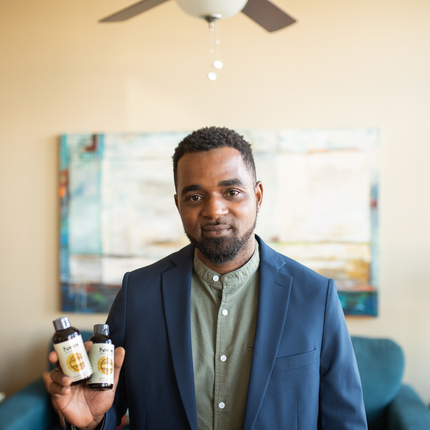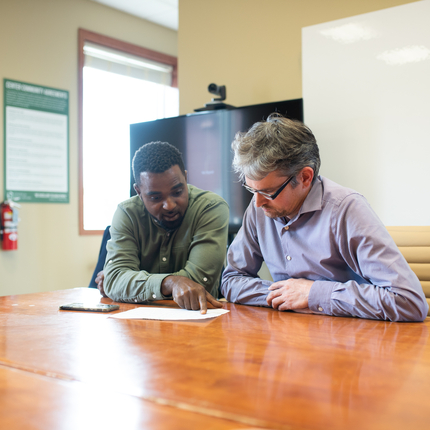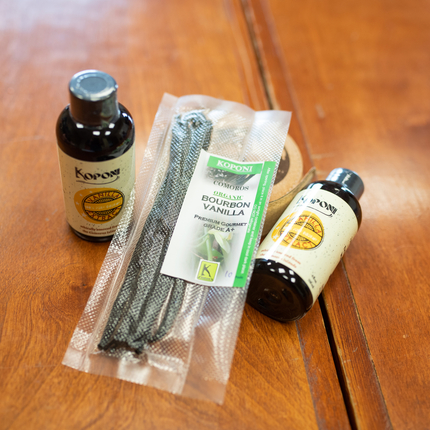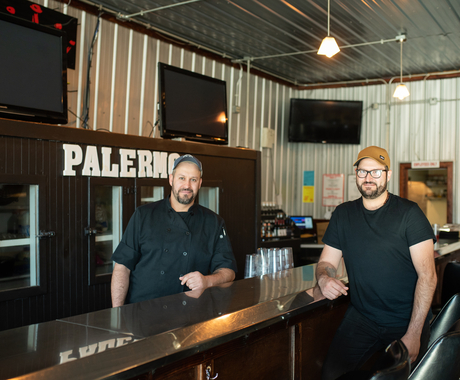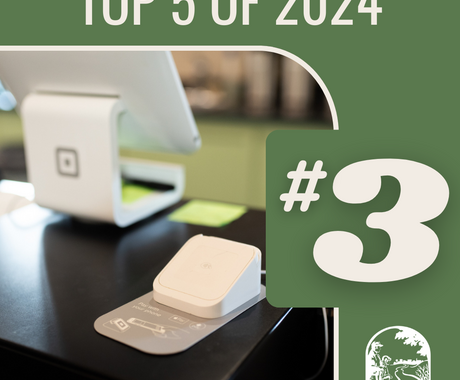Para la versión en español, oprima aquí.
Fouad Mhadji Issa says Nebraska vanilla will be the next big thing. Like beef. Or sweet corn.
Koponi Vanilla, his business in Grand Island, Nebraska, sells gourmet beans, paste, and extract. Fouad is working hard to make Koponi a premium product sought after by chefs and home bakers nationwide.
Yet the enterprise nearly died before it began, starved for lack of capital.
Armed with a business plan and vanilla samples, Fouad sat with bankers and traditional funders to pitch his dream and get a loan. They all said no.
He didn't have assets. He didn't have collateral. He didn't have credit.
Then Fouad found the Center for Rural Affairs.
The Center gave Fouad the loan he needed to buy tanks, pumps, and equipment to scale his manufacturing process beyond samples.
"I don't know where I would be right now because there's no way I could work myself and make the money. You were able to say, ‘We trust you, we believe in you,’" Fouad said of the Center. "I can produce, sell, reinvest, and keep going."
Center staff worked with Fouad to ensure he was ready for a loan and had the financial knowledge to succeed. He's now making loan payments, growing his sales, gaining equity in his business, and building credit to become Main Street bankable.
"Fouad is a perfect example of the client we want to be helping—those with limited assets and good work ethic," said Kim Preston, director of Lending Services with the Center for Rural Affairs.
Mixing Nebraska + vanilla
Education brought Fouad to the Cornhusker state. He attended Western Nebraska Community College in Sidney for aviation in 2009. During the final semester, his father became sick, and Fouad left school to return to Comoros. Fouad later found work in Nairobi and Paris but wanted a better life. He decided to seek opportunity through entrepreneurship.
Fouad learned that the U.S. is the single largest vanilla importer worldwide. The country imported $324 million worth of vanilla in 2021. And he knew just the place to source high-quality vanilla beans: Comoros, a small island north of Madagascar in Africa, where he grew up.
With the seed of a business idea, Fouad returned to Nebraska in March 2021 to kickstart his dream.
"Most importantly for me, where I'm living, it's the people I'm living with," he said. "I wanted to be somewhere that any time of the day, of the year, I'd be comfortable. And, Nebraska, that's where I feel comfortable."
Building a business
Fouad's first stops were the Grand Island Chamber of Commerce and Grand Island Area Economic Development Corporation. He met a local business owner who offered him a building for rent and a basement to sleep in. He worked with chamber staff to create a business plan and the Nebraska Innovation Campus at the University of Nebraska-Lincoln to develop and hone the vanilla extract recipe.
He also worked two jobs, the first at a meatpacking plant and the second at Zabuni Specialty Coffee in Grand Island, where he got a crash course in roasting, manufacturing, order-taking, and shipping. Fouad has since left Zabuni Specialty Coffee to focus on his own business and dreams of the day he can leave meatpacking.
He makes Koponi Vanilla Extract through a slow process that he says preserves complex flavors better than traditional methods. Each batch is extracted and matured for more than 2,000 hours, about three months, with no preservatives. Most large commercial producers add caramel, carbon dioxide, and heat to create extracts in two to three days.
"But, what happens when you use heat? You kill a lot of molecules for the bonding," Fouad said. "So that means you don't get really good vanilla. You kill 30% of it, which becomes less and less flavorful."
Fouad produces 100 gallons of extract at a time and distributes his products at six retail stores in North Platte, Hastings, and Grand Island, and at area farmers markets. He also supplies to a brewery and sells online.
Demand has outstripped supply. Fouad plans to scale up to 300-gallon batches soon.
"I would like to do it as soon as I can," he said. "I'm working to make sure I have an income, but at the same time, I'm losing production time and sales. I'd love to be able to wake up in the morning and have all my focus on vanilla."
The Center for Rural Affairs is here for Fouad as he grows his business, and we look forward to seeing his progress and growing impact in his rural community. Fouad has limited store hours, but you can visit the Koponi Vanilla online store at mykoponi.com.
Feature photo, top: Fouad Mhadji Issa pitched his business idea to bankers and traditional funders who all said no. The Center for Rural Affairs stepped in to give him the money he needed to start Koponi Vanilla.
Feature photo, middle: Fouad Mhadji Issa shows Brian Depew, Center for Rural Affairs executive director, his plans to scale up Koponi Vanilla. Currently, he makes 100 gallons of extract at a time and wants to increase production to 300 gallons. When he grows the business, he will be able to leave his meatpacking job to focus fully on vanilla. | Photos by Kylie Kai

